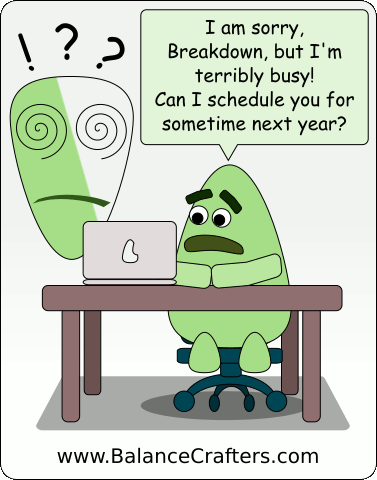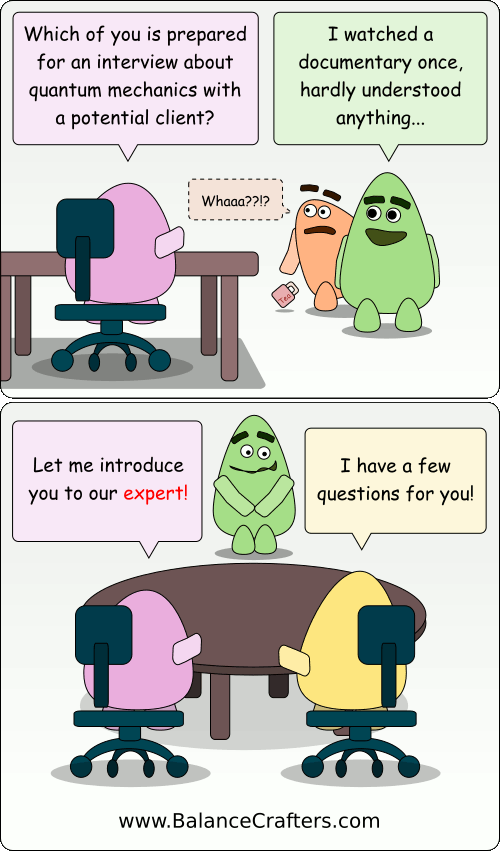These days, technology is moving so fast that it’s quite hard to keep up with it while having a life and doing our job properly.

While we might feel comfortable in learning new things, reaching a state of mastery on any subject takes time. With the current dynamic in companies, many times the learning happens while doing. Additionally, we need to collaborate with people which may be more experienced than us on the subject.
When this happens, do we simply say “I’m new to this and willing to learn” or pretend we know everything and hope that nobody notices?

I think that preparation is necessary for any meeting, but there will always be surprises.
Having a strategy in dealing with them might make the difference between winning a contract or in extreme cases losing our job, depending on the context.
When I am facing topics I have little knowledge about, I go through several steps, asking myself the following questions along the way:
Step 1. Is my lack of knowledge acceptable to the audience?
Case 1. It is acceptable
If it is a discussion within a team that I trust, I will likely admit that I’m not familiar with the subject. This will promote an honest conversation and allow the other people to step in and share what they do and don’t know, which promotes a smooth collaboration.
Case 2. It is acceptable, but a little risky
Maybe answering “I don’t know” might be considered unprofessional in the context I find myself in. Or maybe I said “I don’t know” too many times already.
In that case, I try to postpone my answer, by saying something along the lines of: “I want to check this before giving you a definitive answer. Can I come back to you in X days?”.
This is an indirect way of expressing the lack of knowledge, but gives confidence to the audience that we are honest about what we know and they will tend to trust our other answers.
Case 3. It is not acceptable
If I risk losing my job or I anticipate other serious consequences for exposing my lack of knowledge, I continue to the next step.
Step 2. Is there anyone in the group that has the required knowledge?
Case 1. There isn’t anyone
In this case, I try to steer the discussion towards defining what needs to be solved.
Gathering as much information as I can: what is the context? What are the problems? Are there any potential solutions already taken into consideration? What would be the desired result?
Then I would try to postpone any decision to a later point in time.
Doing this will allow me and the team to do the research or find the people that can help.
Case 2. There is someone
I go to the next step in the evaluation.
Step 3. Are they friendly or hostile?
3.1. Friendly
By “friendly” I mean one of the following:
- They have the same goal as me and the team.
- They assume I have the knowledge that I actually lack.
In this case, I simply try to let the people with the knowledge get their points across.
If I trust that they have the expertise to make decisions on the spot, I respect their decisions and only intervene where I have arguments.
I concentrate on being attentive and preserving a polite/friendly discussion, maybe add a joke or two, if joking is appropriate in the context.
3.2. Hostile
This is the hardest situation to be in.
To recap, we are in a situation in which our lack of knowledge has serious consequences, facing someone who acts suspicious towards us and maybe even seeks to expose our lack of knowledge on a particular subject.
In this situation, a simple “I don’t know” is probably not an option.
An idea that comes to mind is to bluff and tell things that I imagine to be true.
I am not a good poker player, so I don’t bluff. And I would recommend you not to bluff either, because if they realize you are bluffing, you will lose your credibility completely.
Anything you said or will say afterwards will be doubted.
My approach in this situation is to:
- Only make clear statements about things I am confident about.
- If I am directly asked, I might try an analogy with something I do know.
- For example, if asked about my experience with a particular feature of program X, I might respond with something like: I know that for program Y, this feature works such and such. I have not used the feature in program X, but I expect it to be similar with the one in program Y.
- This minimizes the impact of not knowing that feature. Since we already know something similar, it implies that learning what is required would be a minor obstacle.
- I try to find out what the person asking actually needs.
- Sometimes they seek to show everybody that they are highly skilled on that matter.
- I might politely suggest that we can all learn from their experience and invite them to share their knowledge.
- It sometimes gives the person the attention and appreciation that they need, potentially diffusing the tension.
- I would try to postpone discussing things I don’t know for a later point in time.
- I’ve also seen the strategy of responding as if another question was asked, sometimes with a very long response that bores everyone to death, until nobody remembers what was the actual question, or don’t want to risk being bored again.
- While I’ve seen it working, I am not experienced in bullshitting my way out of difficult situations and I don’t recommend it, at least not as a primary strategy.
- If nothing works and I have to say “I don’t know”, I will try to make it in a way that does not attract too much attention.
- For example, I won’t blame myself or others for not knowing something or finding excuses.
- I will simply state that I have limited knowledge/experience on the subject and it is something I intend to learn/review.
Conclusions and recommendations
When the situation requires us to collaborate, having a strategy for dealing with our lack of knowledge can improve our chances to get to the outcome that we seek with the least amount of conflict.
My approach is to try being honest while preserving a professional attitude, if possible. If my lack of knowledge can have serious consequences, I try to minimize the effects by postponing answers, listening and building trust with the audience.
Additional material
I came across this insightful YouTube video with Sir Ken Robinson, talking about the power of “I don’t know”, while remembering a story involving The Dalai Lama.